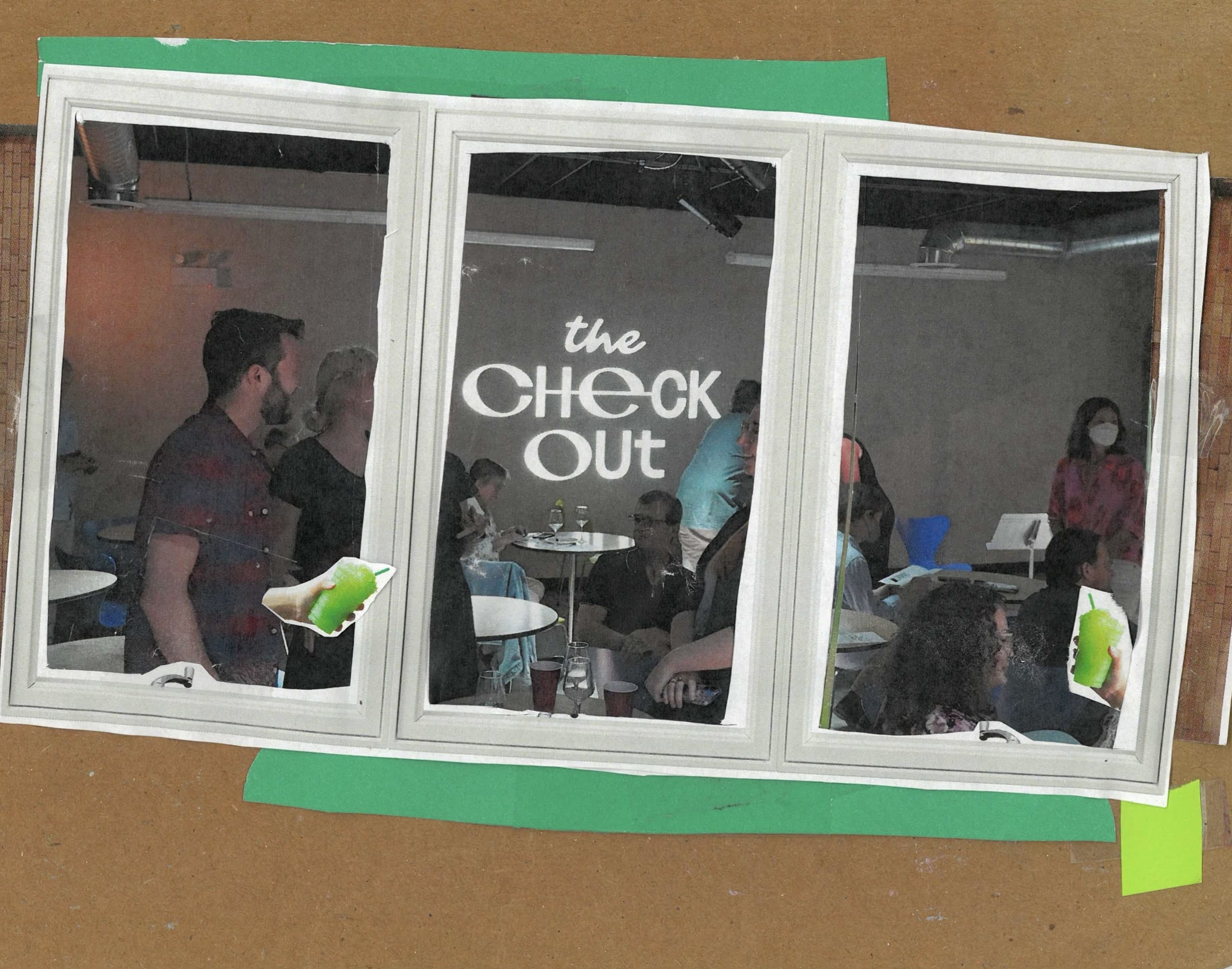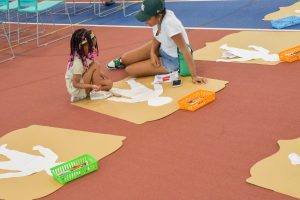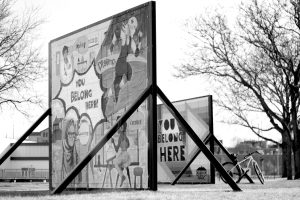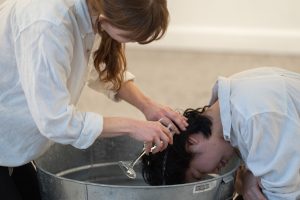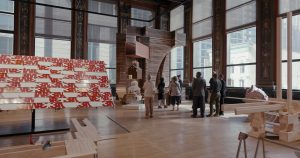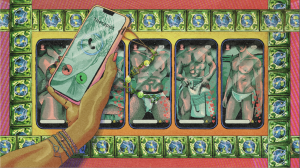Tuning Away from Mechanized Listening features Midwest’s music ecosystems—listening cultures where thoughtful curation, collective engagement, and storytelling still shape what and how we hear. This series is meant to be a reminder: listening can be more than a passive, prescriptive experience.
The responses for this interview were gathered using voice-to-text transcription of a conversation held over Zoom on September 17. The responses were lightly edited for clarity.
On a warm evening in mid-September, I rolled up to The CheckOut on a rental scooter and found the new music venue already buzzing with concert patrons. The long-empty building, perched on a small but highly visible triangular lot along the border of Chicago’s Uptown and Lakeview neighborhoods, was recently renovated by the local nonprofit Access Contemporary Music (ACM). On September 13th, The CheckOut opened its doors as a multipurpose arts hub that seats up to sixty audience members. Only a few hints at the building’s past life as a 7-Eleven now remain: the distinctive chime on the front door and the spiked slushie on the bar’s menu.
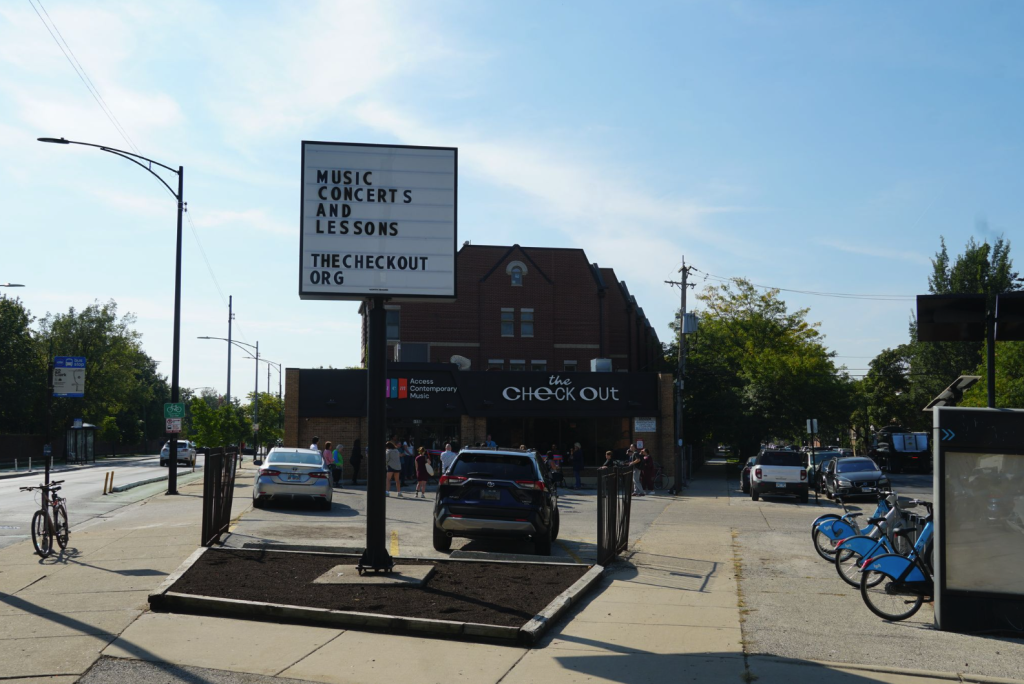
The evening’s program, part of The CheckOut’s 12-concert inaugural festival, featured four pieces of chamber music commissioned by ACM in honor of the 50th anniversary of “Working,” the groundbreaking oral history book by Studs Terkel. A Pulitzer Prize-winning author, historian, actor and broadcaster, Terkel spent most of his life in Chicago and was passionate about documenting the daily lives of American workers.
Composers Shanan Estreicher, Natasha Bogojevich, Seth Boustead and Alicia Walter explored several individual stories and broader themes from “Working” in their commissions, which were performed by Black Oak Ensemble, a local string trio. Estreicher’s piece, “I Give Them Music,” evoked the orderly routines of an elementary school classroom, filling The CheckOut’s intimate space with calming repetitive melodies and pleasant open harmonies. Walter, whose mother’s cousin was featured in “Working,” used direct quotes from her loved one’s interview, among others, in her composition, “Work Cycle.” The singer-songwriter joined Black Oak Ensemble to perform the piece, which blended spoken-word lyrics and soulful vocals with piano and strings accompaniment.
The musical performances were interspersed with a live conversation about Terkel’s legacy featuring audio journalist Bill Healy and author Mark Larson. Working in the 21st Century, Larson’s most recent book, follows in the footsteps of “Working” and was released in 2024 to commemorate its 50th anniversary. Earlier in his career, Larson was interviewed by Terkel about his job as a high school teacher, and he shared fond memories of Terkel’s exceptional listening skills. Healy, producer of the Pulitzer Prize-winning podcast “You Didn’t See Nothin,” reflected on Terkel’s transformative impact on the field of oral history.
In addition to this homage to Terkel, the opening festival’s other concerts ranged from classical to jazz to cabaret, with programs including a celebration of composer Arvo Pärt’s 90th birthday and a reflection on the book “Sapiens: A Brief History of Humankind” by Yuval Noah Hariri. The lineup featured many local performers, such as the Kontras Quartet, pianist Matthew Hagle and the genre-bending band Wicked Drawl. For the opening concert, ACM commissioned seven works by Chicago composers inspired by historic photos of Uptown captured by Bob Rehak in the 1970s.
“The opening festival is me daydreaming about what The CheckOut could look like down the road,” said Boustead, ACM’s founder and executive director. “The idea is that it’s very eclectic.”
Founded in 2004, ACM champions contemporary classical music by commissioning new works from dozens of composers each year, producing live music and multimedia events, and operating music schools in four Chicago neighborhoods. The CheckOut is ACM’s first permanent concert venue; the space will also host related activities such as music lessons.
ACM’s roots go back to 2002, when Boustead grew frustrated with the lack of opportunities for composers after earning a Master of Music Composition degree from Chicago College for the Performing Arts. Beyond musical circles, he found that most people didn’t have any understanding of what composers do — much less than they might about other creatives such as playwrights and filmmakers. “I just felt like I needed to do something about it,” he recalled.
Observing that many arts organizations outside of classical music had more robust models for nurturing new talent and drawing in new audiences, Boustead looked to the worlds of dance, theater, film, and visual arts for ideas. The Chicago-based company Hubbard Street Dance “really spoke to me,” he said. “It was a full ecosystem around dance,” with an ensemble, a school and a commissioning program.
As ACM’s first venture, Boustead started a series of weekly reading sessions featuring music by living composers. Any composer could submit a piece, and Boustead and his musician friends would volunteer their time to rehearse and record the composition, then post the recording online.
“A lot of my philosophy was shaped during these weekly readings years, because what I learned was [that] a surprising amount of music is good,” said Boustead. “My fundamental premise is that if you give composers a shot, the vast majority of them are pretty darn good, and so we, from day one, have been very interested in performing the music of lesser-known composers.”
As some of the musicians became especially dedicated to this goal and discovered pieces that had potential for professional performances, ACM formed a resident ensemble called Palomar — an umbrella name for a group with flexible instrumentation and a rotating roster — and began to present concerts at venues around Chicago. Other programs soon followed, such as the Sound of Silent Film Festival, which screens new short silent films alongside live performances of newly composed scores, and Relevant Tones, a radio broadcast turned podcast that explores contemporary classical music. Ten years ago, ACM launched another annual festival called Thirsty Ears, Chicago’s only classical music street festival.
Education has been another priority from early on. Renting its first storefront eighteen years ago, ACM began to offer private lessons and hold its weekly reading sessions in the front windows, with the goal of making classical music more visible and integrated into the community. This effort grew into a chain of music schools, which provided earned revenue that helped sustain the company through the financial crisis of the late 2000s. Although two locations later closed during the COVID-19 pandemic, about three hundred students currently take lessons at ACM’s schools in the neighborhoods of Avondale/Logan Square, Ravenswood, Rogers Park, and, with the addition of The CheckOut, Lakeview/Uptown.
“This idea of music making in the window” encapsulates much of Boustead’s vision for making classical music more accessible. “It’s still something that I think would solve the classical music crisis in a heartbeat,” he said. “If you could have a storefront music school/venue, or a venue/music school, in every community in Chicago, that was actively presenting classical music on a regular basis and offering affordable lessons for people, within a few years, people would say, ‘Oh, classical music is cool. There’s a place in my neighborhood.’”
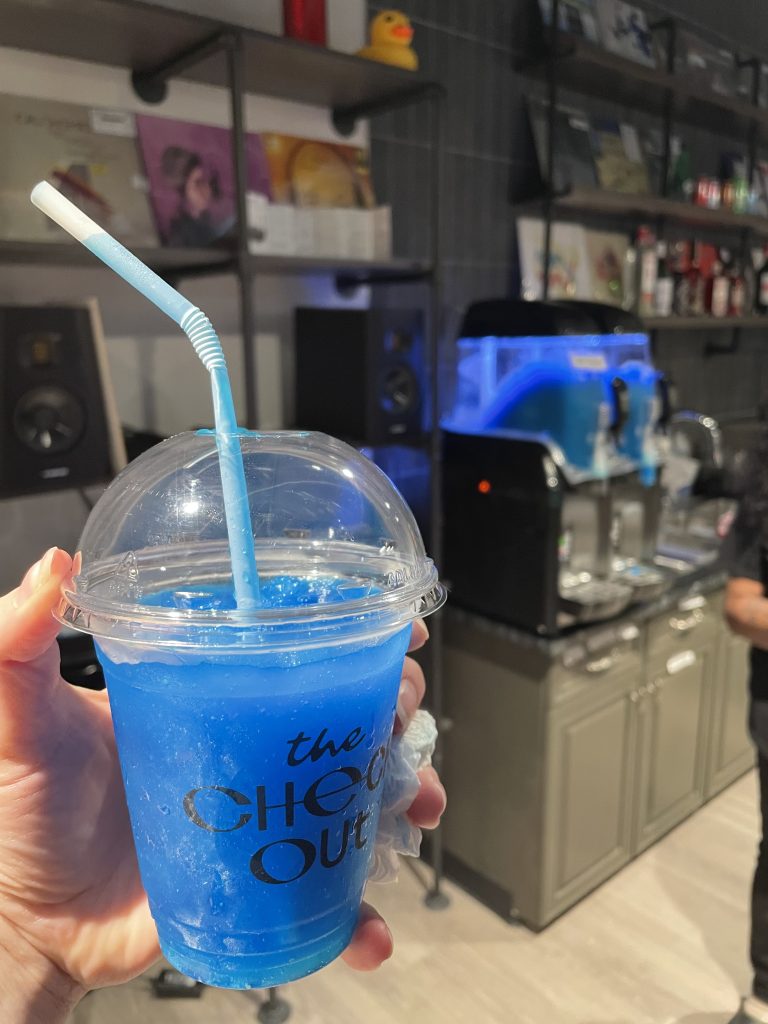
The CheckOut represents an ambitious step toward realizing this vision. In addition to hosting its own concerts and music lessons, ACM plans to rent the venue to other performers and arts organizations that align with its big-tent aesthetic. (Don’t expect any heavy metal concerts, said Boustead.) Following the inaugural festivals, most of the October and November events are rentals. If all goes well, rental revenue will help to sustain ACM’s own programming and provide a boon to artists in a city that has lost multiple music venues in recent years.
“It’s meant to be a community space,” said Boustead. “We’re working on figuring out who’s going to run it, because I don’t want to be there every day. No venue, no project, especially in a nonprofit, should ever rest on one person, and I don’t want to do all the programming either. I want to breathe life into it and say, ‘This is the vision that I have, but other visions are welcome.’”
“I want it to be busy all the time,” he continued. “I just want to do a lot of things to show people that classical music is fun, that it’s accessible, that it’s diverse and modern and reflective of the people who exist today. I want to inspire other people, and I want it to be a hub for creativity, and I want it to be a center for community.”
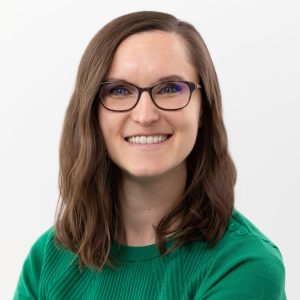
About the author: Emily McClanathan is a freelance arts journalist and critic based in Chicago, primarily covering theater, books and music. Her work has appeared in the Chicago Tribune, Chicago Reader, American Theatre, Playbill, INTO and more.
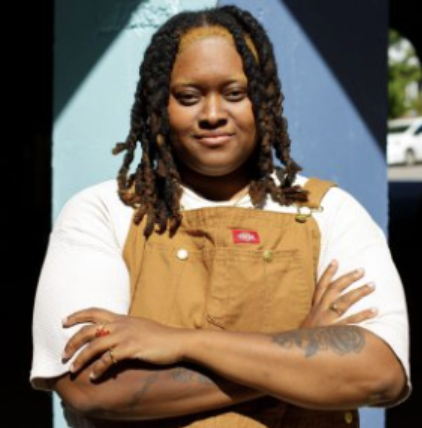
About the illustrator: Bri Robinson is a mixed media artist, analog collagist, sculpture artist, and historian who weaves intricate narratives of love, loss, and identity across the expansive Midwest. Through their unique process of cutting, pasting, and layering, Bri deepens the meaning of these found objects, transforming them into evocative works of art. Bri’s practice is deeply rooted in the exploration of identity, relationships, and the constant evolution of self. By merging archival materials with elements of popular culture, they create thought-provoking narratives that invite viewers to engage with the complexities of the queer experience. Through their work, Bri honors the past while also pushing the boundaries of contemporary art history, crafting pieces that are as introspective as they are expansive. Check out their work on instagram @niq.uor.
